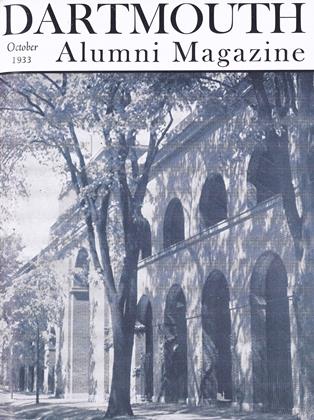The success which attended the initial opening of the Dartmouth Summer Camp last summer promises much for the future permanency of the project.
Starting as the brain-child of three or four interested students, the idea became a reality on June 28 when seventeen boys arrived at Crystal Lake, near Enfield, New Hampshire, for a two weeks' period. They had been selected from Manchester, Dover, Portsmouth and Nashua by social workers, and had been brought to the camp in camp cars from the State House in Concord. Thus the Dartmouth Summer Camp provided even the transportation for the boys. Also free were the services of the counsellors, who were all Dartmouth students. For director, the Dartmouth Camp was most fortunate in having Tom Dent, coach of soccer and lacrosse. It also had the use of the Mascoma Camps, which were available for the summer and equipped for several times the number of people who were housed there. In reality it is similar to a fresh-air camp, but it was run strictly as a private camp.
Known to scarcely a handful of students and townspeople when it opened, by the end of a month the experiment had interested many in and about Hanover, and news of it reached other places as the boys returned to their homes. However, there are many more who would like to hear about the work that has already been done, and many of these will be reached through the ALUMNI MAGAZINE.
The idea of the Dartmouth Summer Camp was derived from a summer camp at Princeton which started a quarter of a century ago and has been operating very successfully ever since. A fund of approximately $4,000 is raised annually from the Princeton students to finance their summer camp.
The Dartmouth Camp at Enfield, however, expended only a little over $7OO. It was financed not by a student drive, but by contributions from several campus organizations and the Hanover Rotary Club. Although supported by student organizations, the camp staff was separate from and independent of these groups.
These organizations and the student body may see for themselves what the camp was like, because movies of typical camp activities were taken and will be shown in Hanover this fall.
The best measure of a camp's success is the happiness which it gives to its boys, and the fact that the entire thirty-five under-privileged boys who attended the camp are most anxious to return another summer leaves little room for doubt about its success.
 View Full Issue
View Full Issue
More From This Issue
-
 Article
ArticleHANOVER BROWSING
October 1933 By Rees H. Bowen -
 Article
ArticleNEW COLLEGE RESPONSIBILITIES
October 1933 By Ernest Martin Hopkins -
 Class Notes
Class NotesClass of 1930
October 1933 By Albert I. Dickerson -
 Article
ArticlePRESIDENT'S ADDRESS TO THE ALUMNI
October 1933 -
 Article
ArticleARE WE GOING TO WIN?
October 1933 By Pat Holbrook '20 -
 Class Notes
Class NotesClass of 1910
October 1933 By Harold P. Hinman







